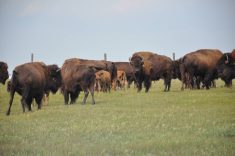A small, resolute group has revived the Western Canadian Wheat Growers Association.
A new board of 11 young farmers came forward during a revival convention held last week in Calgary.
The interim board includes Cherilyn Jolly as president, Randy Hoback as chair and Dean Klippenstine as vice-president. One board member is from Alberta, three from Manitoba and seven from Saskatchewan. The new board did not feel this lack of regional balance would be a problem in addressing farmer concerns.
“I don’t know if significant Alberta representation on the board is going to make any difference in how we approach the Canadian Wheat Board,” said Jolly in an interview following the March 18-19 convention.
Read Also

Trump’s tariffs take their toll on U.S. producers
U.S. farmers say Trump’s tariffs have been devastating for growers in that country.
In the past, the wheat growers were often criticized for being a single issue group fighting against the wheat board. The new group wants to celebrate other achievements and interests.
The executive suggests it must become familiar with a few issues before it takes on a broader list of concerns including marketing options, transportation issues, rural economic development, environmental causes, intergenerational transfer of farmland, land taxation and safety nets.
“Logistically it is impossible to address every issue that is out there,” Klippenstine said.
They plan to talk with western farmers to rewrite the policy book.
“We want to know what their priorities are, what their focus is and what their interests are. We’re not here to represent our interests. We’re here for the interests of all farmers,” said Jolly.
Making a profit on the farm is a singular goal for board members.
“We have to discover what the opportunities are so we can participate, whether it is value-added or new varieties of wheat. We want to make sure we don’t have any barriers placed in front of going down those alleys,” Klippenstine said.
As a youthful group, they are comfortable with modern communication. Since there is no office, the early organizing will be done via conference calls, e-mail and a redesigned website to be posted soon.
Poor communication with members was said to be one of the downfalls of the organization when it shut down June 30, 2003.
Membership and money had dwindled to the point where the 33-year-old organization decided to take a drastic step and shut down.
Its demise shocked many and a renewal committee was in place soon after to pay off debts and regroup.
With member support of $150 each, the committee paid off all debt but was reluctant to reveal how much in the red the association was or where the books stand now as a registered non-profit group.
“We’re in a sound financial position and we are in good shape for now and we are working on finances for the future,” said Klippenstine.
Exact membership numbers aren’t known but the convention had about 170 registrations and a sponsorship list that included a who’s who of the agriculture business.
The Canadian Wheat Board, Alberta Agriculture, Agricore United, CP and CN Rail, Winnipeg Commodity Exchange, BASF and John Deere were among those that supported the two-day event.















